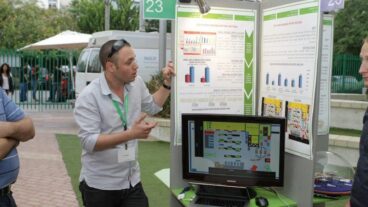Professors Avigdor Scherz and Yoram Saloman of the Weizmann Institute in their lab – We see that the therapy results in the complete destruction of the blood vessels connected to the tumor.Announcing his diagnosis of prostate cancer on Monday, Prime Minister Ehud Olmert was able to speak calmly about his condition.
“There is nothing about the tumor which is life-threatening or liable to impair my performance,” he assured the waiting media in Jerusalem.
But just a few years back, it would have been difficult to remain so clear-headed about the disease. Prostate cancer is the most common type of cancer found in men, other than skin cancer.
One man in six will get prostate cancer in his lifetime. While today, more than 99 percent of patients are alive five years after diagnosis of prostate cancer, a couple of decades ago that survival rate was more like 40 percent, or lower.
Even given such promising leaps and bounds, prostate cancer remains nothing to treat lightly. So Olmert might be glad to know that a scientific development that has emerged from Israeli labs is proving to be an effective treatment for prostate cancer when radiation proves unsuccessful.
Researchers based at the Weizmann Institute in Rehovot have played a central role in the development of a light-sensitive drug based on the plant pigment chlorophyll. Called Tookad – after the Hebrew term meaning “the warmth of light”, the drug remains harmless until exposed to a laser beam – at which point it becomes toxic. Injected into a patient, Tookad can be activated by doctors through the use of optical fibers – allowing the selective destruction of the blood vessels which feed the tumor, whilst leaving healthy tissue intact.
“Chlorophyll is designed by nature to harvest solar energy for photosynthesis, so it has high absorption of light,” explained Prof. Avigdor Scherz of the Weizmann Institute’s Plant Sciences Department, who together with Prof. Yoram Salomon of the Biological Regulation Department, invented the new photo-sensitive drug.
“In general, we see that the therapy results in the complete destruction of the blood vessels connected to the tumor, and necrosis of the entire tumor.”
This kind of approach, known as photodynamic therapy (PDT), did exist prior to the development of Tookad. But the new drug proved vastly more effective than its predecessors, which were based not upon chlorophyll but upon hemoglobin pigment. Unlike other PDT drugs, which remain in the body for a long time, Tookad is flushed out within two hours, reducing the need for patients to avoid sunlight for lengthy periods following treatment.
Tookad also has the great advantage of being able to absorb near-infra-red light, which penetrates more deeply and efficiently than other wavelengths. Using Tookad, a single illuminated optical fiber can reach and eradicate a tumor with a diameter of up to 4 centimeters, and even larger growths can be treated by using several fibers. What this means is that the Israeli-developed drug is effective against large, solid tumors which previously had evaded the reach of other PDT drugs.
Subsequent trials have borne out Scherz’s confidence, with a 2006 results of Tookad at McGill University in Montreal reporting that 46 percent of patients showed no evidence of prostate cancer after treatment with the drug.
“We have proof that this treatment causes the destruction of the part of the prostate which contains the cancer,” said McGill University Hospital urologist Dr. Mostafa Elhilali, who took part in the trials.
Advanced efficacy and safety studies are continuing in the United States, the United Kingdom, Canada and France – and Israel, where phase I/II clinical trials are currently underway as second line therapy for prostate cancer patients for whom alternative treatment strategies had failed.
While Olmert’s doctors said at Monday’s press conference that his microscopic cancerous growth would be treated with surgery, and wouldn’t require either subsequent chemotherapy or radiation, others less fortunate to have the disease caught so early may ultimately feel very lucky that they’ll one day have a therapy like Tookad available.












